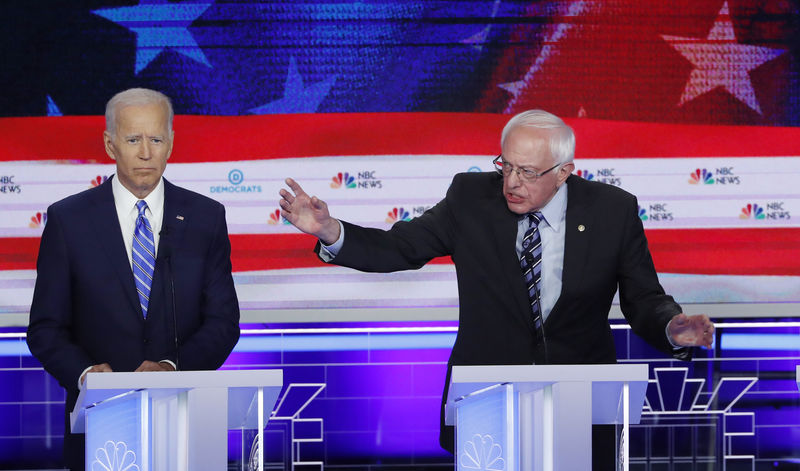By John Whitesides
WASHINGTON (Reuters) - Democratic presidential front-runner Joe Biden and rival Bernie Sanders are waging a public battle this week over universal healthcare, staking out competing turf on an issue that has become the most divisive in the party's primary campaign.
The sniping between the two White House contenders, highlighted on Wednesday when Sanders delivered a defense of his ambitious "Medicare for All" plan, has split Democrats and forced other candidates to choose sides on an issue certain to play prominently in next year's general election race.
The different approaches reflect the tension in a Democratic Party torn between progressives like Sanders seeking major systemic changes and moderates like Biden who want a more pragmatic approach - and the concerns about which approach would be a winner against Republican President Donald Trump in November 2020.
Biden, vice president for eight years under former President Barack Obama, said a $750 billion plan he introduced on Monday would strengthen Obama's landmark healthcare law known as Obamacare and include an option for a paid government-run plan.
Medicare is the government insurance plan for the elderly and Sanders wants to shift Americans into a Medicare-based, single-payer system that largely eliminates private insurance.
Biden called Sanders' proposal an unrealistic and costly threat to Obamacare.
"Starting over makes no sense to me at all," Biden said.
U.S. Senator Sanders, an independent who has been a leader of the Democratic Party's progressive wing since a losing 2016 presidential run, said he helped pass Obamacare and defend it from Republican repeal efforts.
He said it was time to go further, however, and that his proposal was an effort to break the influence of corporate industry interests.
He called Biden's criticism "absurd" and openly questioned which side Biden and others who oppose Medicare for All were on.
"At the end of the day, you've either got to be on the side of the people or the side of the health insurance companies. I know what side I'm on," Sanders said after Biden released his plan.
On Wednesday, Sanders shrugged off critics who have questioned whether his plan should eliminate private insurance.
"I have never met one person who loves their insurance company," Sanders said in a speech in Washington.
Both Sanders and Biden are looking to rebound from a dip in their opinion poll numbers after the first Democratic presidential debate in June.
The Sanders campaign, angered by Biden's complaints about Medicare for All, ran an online quiz on Tuesday asking people to identify who had made various claims against the proposal. Options included Biden, Trump and Senate Republican Leader Mitch McConnell.
DEMOCRATIC TENSION
Four other White House candidates in the U.S. Senate - Kamala Harris of California, Kirsten Gillibrand of New York, Cory Booker of New Jersey and Elizabeth Warren of Massachusetts - have signed on to Sanders' Senate bill, although they have been less adamant about eliminating private insurance.
Harris, who has risen in polls since the debate, said on CNN that her preferred version of Medicare for All would reduce but not end private insurance, and would include an opportunity to purchase supplemental insurance. The Medicare program for seniors now includes private supplemental plans.
Harris also told CNN she would not favor a middle-class tax increase to pay for the plan. Sanders has said he would pay for his bill with a combination of taxes on employers, individuals, businesses and the wealthy.
The liberal Urban Institute estimated the Sanders plan would cost $32 trillion over a decade, with the additional taxes raising about $15 trillion.
Republicans have criticized the Sanders bill as a socialist pipe dream that would be too costly and weaken the U.S. healthcare system. They have promised to make it a main issue in the election.
Some Democrats worry Sanders, who pushed eventual nominee Hillary Clinton to the left during their 2016 primary, would prevail on issues such as healthcare and leave the party vulnerable against Trump.
"We can't let Senator Sanders be the reason we lose to Donald Trump. We can't afford more impossible promises from politicians," said presidential contender John Delaney, a former congressman who barely registers in opinion polls.
On Wednesday, Sanders challenged his campaign rivals to reject donations from the health insurance and pharmaceutical industries, saying it was a crucial step toward fundamental reform.
"You can't change a corrupt system by taking its money," Sanders said in his speech.
"If we are going to break the stranglehold of corporate interests over the healthcare needs of the American people, we have got to confront a Washington culture that has let this go on for far too long," Sanders said.
The Sanders campaign said his pledge not to accept health insurance and pharma money would cover donations above $200 from drug and health insurance industry lobbyists, executives and political action committees. It would not apply to rank-and-file workers.

Candidates who are unwilling to take the pledge, Sanders said, "should explain to the American people why those interests believe their campaigns are a good investment."